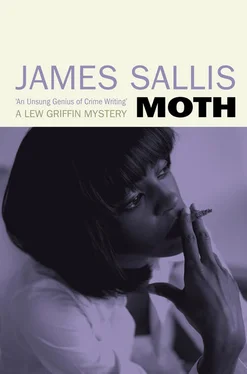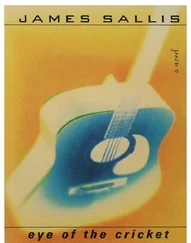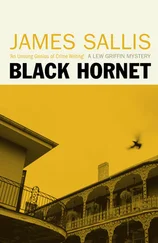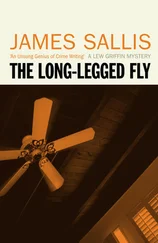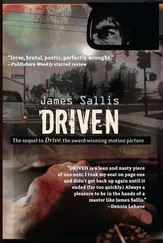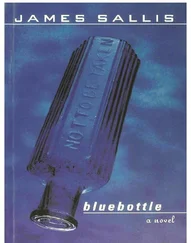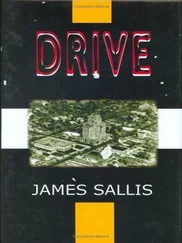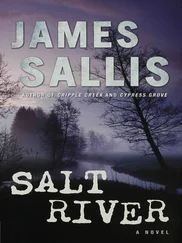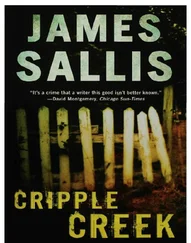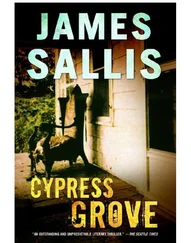James Sallis - Moth
Здесь есть возможность читать онлайн «James Sallis - Moth» весь текст электронной книги совершенно бесплатно (целиком полную версию без сокращений). В некоторых случаях можно слушать аудио, скачать через торрент в формате fb2 и присутствует краткое содержание. Жанр: Криминальный детектив, на английском языке. Описание произведения, (предисловие) а так же отзывы посетителей доступны на портале библиотеки ЛибКат.
- Название:Moth
- Автор:
- Жанр:
- Год:неизвестен
- ISBN:нет данных
- Рейтинг книги:3 / 5. Голосов: 1
-
Избранное:Добавить в избранное
- Отзывы:
-
Ваша оценка:
- 60
- 1
- 2
- 3
- 4
- 5
Moth: краткое содержание, описание и аннотация
Предлагаем к чтению аннотацию, описание, краткое содержание или предисловие (зависит от того, что написал сам автор книги «Moth»). Если вы не нашли необходимую информацию о книге — напишите в комментариях, мы постараемся отыскать её.
Moth — читать онлайн бесплатно полную книгу (весь текст) целиком
Ниже представлен текст книги, разбитый по страницам. Система сохранения места последней прочитанной страницы, позволяет с удобством читать онлайн бесплатно книгу «Moth», без необходимости каждый раз заново искать на чём Вы остановились. Поставьте закладку, и сможете в любой момент перейти на страницу, на которой закончили чтение.
Интервал:
Закладка:
Miss Mara acquitted herself well, the students had actually read Zazie, and discussion was lively. One of the young men took a particular, keen delight in Zazie’s Uncle Gabriel, pitching his voice throughout the discussion in a high, thin flutter he obviously imagined similar to the uncle’s own during his performances as a female impersonator.
As the students filed out, Dean Treadwell came up to me and held out his hand.
“Fine class. Somehow you have a way of making it all real to them, making them care. I wish half of my other teachers could do that.”
“You caught me on a good day. Most others, the snoring would have distracted you.”
“Fascinating. And I never even heard of Queneau before this.”
“Three weeks ago, none of the students had either. A semester from now, most of them will have forgotten him.”
“You have a minute, Lew?”
“Actually, I have about four hours-till my seminar after lunch.”
“Walk with me, then. I’ll buy you a coffee.”
“Sure. But if the coffee’s from one of the faculty lounges, I’ll pay you not to have to drink it.”
We ambled out into the hallway and along it, heads together like two monks strolling the cloisters as they kicked Boethius back and forth.
“I don’t know how you’ll feel about this …”
I let it hang there.
“I understand from some of the faculty members, and from my wife as well, that you worked for many years as a detective.”
“Worked at it, anyway.”
Two of my students from Advanced Conversational passed us. One of them said Bonjour, the other Hey, how’s it going?
We wound up off-campus, at one of the coffeehouses that suddenly seem to be springing up everywhere in New Orleans. This one was a Tennessee Williams set: a hodgepodge of rickety ancient tables and chairs, crumbling plaster walls, windows so hazed you could safely watch eclipses through them, door open onto a dank inner patio where a three-legged cat furiously eyed all trespassers. A massive mahogany counter built directly into the tiled floor and topped with a slab of green marble dominated the room. A cork bulletin board took up most of the back wall, scaled in layers of handbills for alternative music, scribbled ads offering musical equipment for sale, notices of tutors and roommates wanted.
Like many such places in the city, it was a museum exhibit in other ways as well: here, an unregenerate hippie in jeans, work shirt and vest, scraggly hair stuffed into a bandanna; a fifties young professional in polyester “smart” frock and bouffant hair, or facsimile beatnik with goatee, shades and beret; over there, a black man natted out in suit and impossibly wide tie dating from the forties, slicked hair close to his scalp under a wool slouch hat. People have a way of getting stuck in time here in New Orleans. Once a student fresh from New Hampshire asked “Are all these strange-looking people here for Mardi Gras?” and another student told her, “Those are the ones who live here.”
“Why did you give it up?” Treadwell asked me when we were seated over tall, untouchably hot glasses of cafe latte. “Detective work, I mean.”
“I’d tell you I found honest work instead, but you know better.”
He laughed silently, a single brief paroxysm, and looked off toward the patio. Sitting in the doorway with its stump raised for cleaning, the cat glared back at him.
“You’ve been married, haven’t you, Lewis?”
“Once, a long time ago.”
“And you had children?”
“I did. A son. He’s gone now.”
Treadwell’s eyes came back to me.
“Gone?”
I shrugged. “It doesn’t matter. But all this has to be leading up to something.”
“I was married once, when I was younger than seems possible now. It didn’t last long, and afterward, I was by myself for a long time, one of those academic bachelors who comes out of the house on his way to classes slapping dust and crumbs off his coat. I never imagined I’d live any other way. But-What’s the old saying? Life’s all conjunctions, just one thing after another?”
“More like punctuation, I think. Colons and exclamations for some, dashes for the rest.”
“One day in Victorian Life I looked up from my notes and, I still don’t know why, noticed a young woman sitting there in the front row. Older than the other students, but still young to me. And while I was looking, while the fact of her existence was slowly sinking in as I prattled on about the monarchy or somesuch, she winked at me. Not coquettishly at all, you understand, but with this amazing sense of maturity somehow, of being very much her own person … solid.
“I dismissed class shortly thereafter. That was on a Thursday. And by Monday we were married. Twelve years ago. Twelve years. From the first I felt as though I’d packed up everything and moved to a new country. A different language, different customs, different weather-who knows, maybe even different physical laws. Everything changed.”
I waited. Good interviewers never have to say much; they turn themselves into voids, into receptacles.
“Laura is my life now, everything else revolves around her, her and the university. But I have a son by that first, youthful marriage. He’s an adult himself now, of course. We never had much to do with one another, never communicated much; he grew up on the West Coast, mostly. But a couple of months ago he moved back here, to New Orleans, and we began seeing one another. He’d call every week or so. We’d meet for lunch, a glass of wine. It’s an ambiguous relationship, at best. Would you like more coffee?”
I declined, and after a moment he said, “I’m afraid he’s in trouble. I wondered if you might be able to help him.” Then he added: “Laura’s dead against my getting involved.”
This is none of your business, Griffin echoed far back in my head. I said: “I’d have to know two things. What kind of trouble-”
“Drugs. I don’t know how deeply.”
“Then your wife may be right. The other thing I’d have to know is what you’d expect me to do. There’s probably not much you, or I, or anyone else can do. You have to know that.”
He nodded, head remaining momentarily bowed. “I suppose in a sense I’ve dedicated my life to the belief that knowledge, that learning, intellect, reason, matter.” He looked back up. “Yes, I know. I’ve dealt with this in my usual manner: I settled into the library and read everything available. But now I seem to be flying in the face of all that, don’t I?”
“If not flying, at least taking one hell of a leap of faith.”
“Too close to the son,” he said. I wouldn’t have thought he had it in him.
And because of that, as much as anything else, I told him I would do it.
I got the son’s address, a snapshot (his only one, he told me as he pulled it from his wallet) and as many details of his son’s life as he knew. There weren’t many: a workplace that might or might not be current, a bar he’d mentioned a couple of times, a few friends’ first names. His son drove an old mustard-color Volvo, loved spicy food and war movies, was not a reader and had no particular taste for music.
“I want to know how bad it is,” Dean Treadwell said, “how deeply he’s into this. That’s all I expect of you. Maybe then I can find a way to help him.”
“I’ll do what I can. I still have a few contacts out there. I’ll ask around, turn over some stones.”
Treadwell had pulled a checkbook out of his coat pocket and was uncapping a pen.
I shook my head. “This is a favor. Besides, it may well come to nothing.”
“I insist.”
“So do I.”
“Very well, then.” He clipped pen to checkbook and slipped them back into his pocket. “At least promise that you’ll come over for a meal with Laura and me, soon.”
Читать дальшеИнтервал:
Закладка:
Похожие книги на «Moth»
Представляем Вашему вниманию похожие книги на «Moth» списком для выбора. Мы отобрали схожую по названию и смыслу литературу в надежде предоставить читателям больше вариантов отыскать новые, интересные, ещё непрочитанные произведения.
Обсуждение, отзывы о книге «Moth» и просто собственные мнения читателей. Оставьте ваши комментарии, напишите, что Вы думаете о произведении, его смысле или главных героях. Укажите что конкретно понравилось, а что нет, и почему Вы так считаете.
